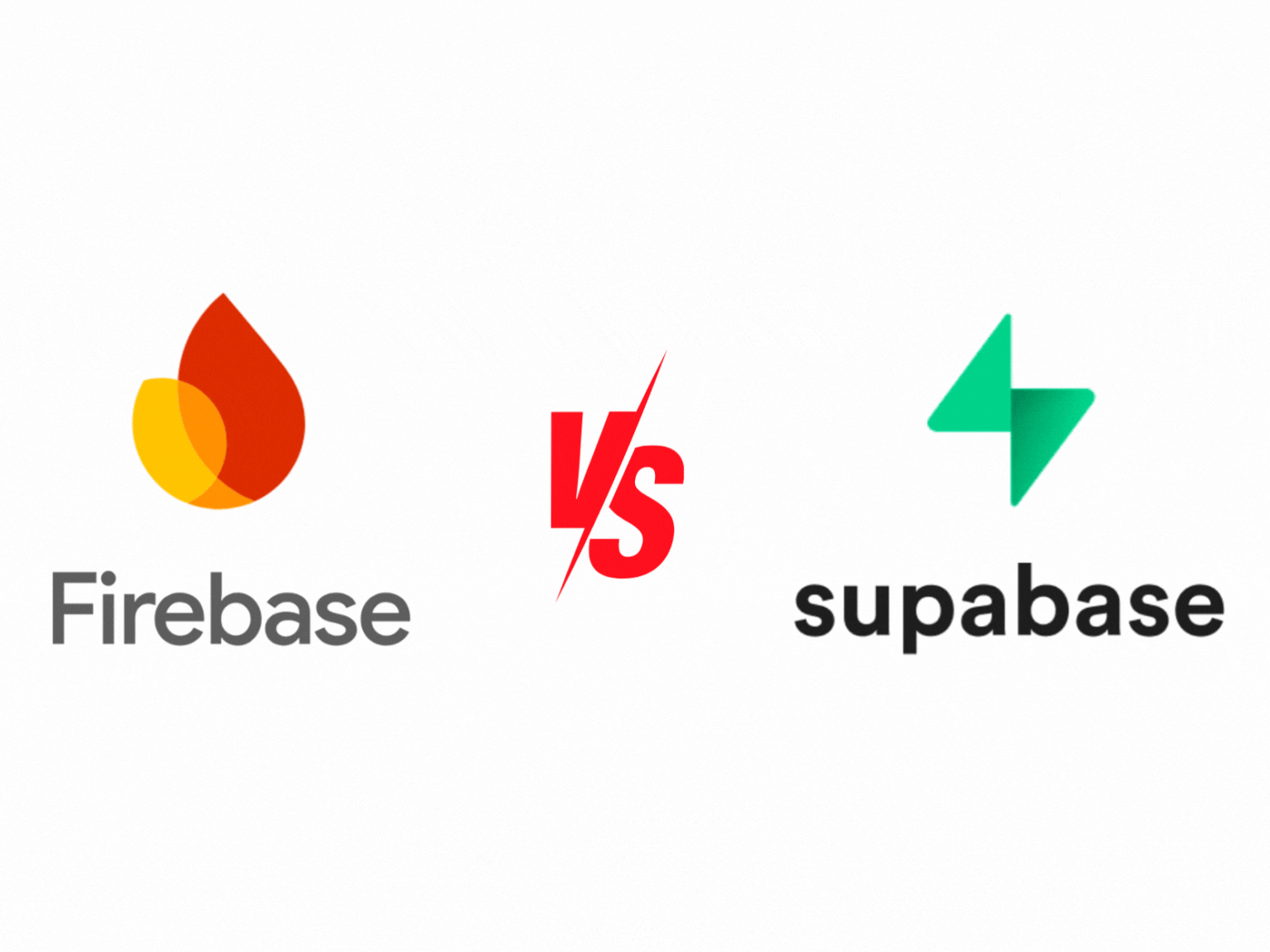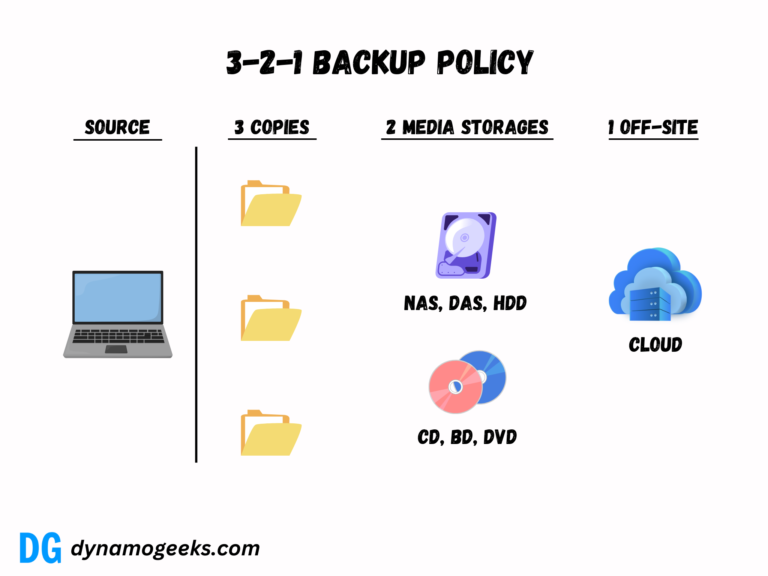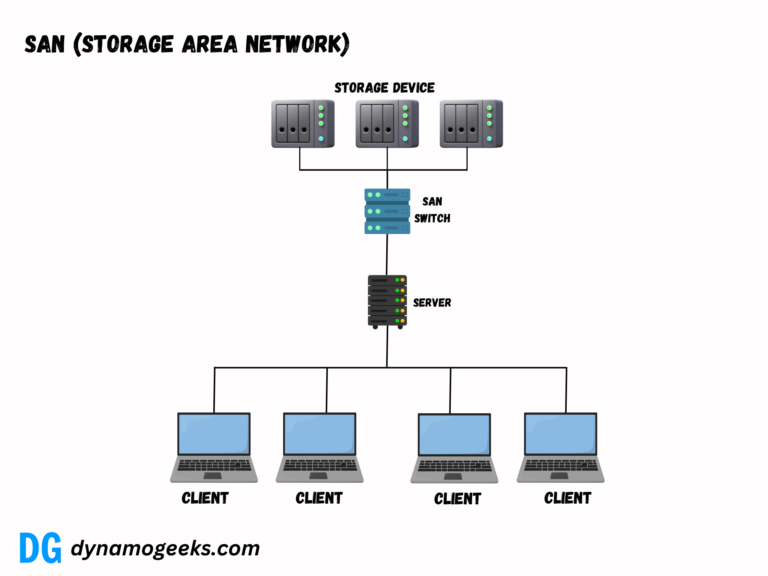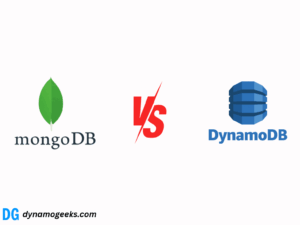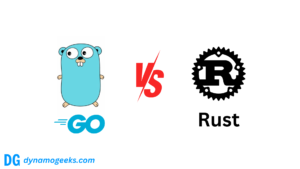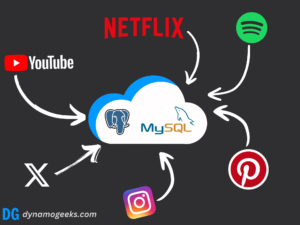Backend-as-a-service (BaaS) platforms have become essential for developers who want to focus on building features without worrying about the complexities of backend management. Among the top contenders in this space are Supabase and Firebase. In this blog, I’ll dive deep into both platforms, providing an expert analysis to help you decide which one suits your needs in 2024.
Introduction to BaaS Platforms
Before we compare Supabase and Firebase, it’s important to understand what BaaS platforms offer. BaaS simplifies the backend complexities by providing essential services like databases, authentication, real-time notifications, and cloud storage. This allows developers to focus more on frontend development, saving both time and resources.
What is Firebase?
Firebase, a Google-backed platform, is a comprehensive BaaS solution that offers a wide array of services. Launched in 2011 and acquired by Google in 2014, Firebase has grown into a go-to choice for developers due to its robust ecosystem, real-time database, and seamless integration with other Google Cloud services.
Key Features of Firebase:
- Real-time Database: Firebase’s NoSQL database is designed to handle real-time data updates, making it perfect for chat apps, live notifications, and multiplayer games.
- Authentication: Firebase offers a straightforward and secure way to authenticate users via email, Google, Facebook, and other providers.
- Cloud Firestore: An improved version of the Realtime Database, Firestore supports more complex queries and scalability.
- Cloud Functions: Write and deploy server-side code without managing your servers.
- Hosting: Firebase provides a fast and secure hosting service for your web applications.
- Analytics and Crashlytics: Integrated analytics and crash reporting tools to monitor app performance and user behavior.
What is Supabase?
Supabase, often referred to as the “open-source Firebase alternative,” is a newer player in the BaaS space. Launched in 2020, Supabase is built on top of PostgreSQL, offering a relational database with real-time capabilities and powerful features that developers love.
Key Features of Supabase:
- PostgreSQL Database: A relational database known for its robustness, scalability, and compatibility with SQL.
- Authentication: Supabase offers a customizable authentication system with support for multiple providers like Google, GitHub, and email/password.
- Realtime: Supabase provides real-time subscriptions for your database, making it easy to create dynamic apps.
- Storage: Manage and serve files with built-in storage solutions that integrate seamlessly with your application.
- APIs: Auto-generated RESTful APIs based on your database schema, making it easy to interact with your data.
- Edge Functions: Similar to Firebase’s Cloud Functions, Supabase’s Edge Functions allow you to run server-side logic close to your users for low latency.
Supabase vs Firebase: A Detailed Comparison

Now that we’ve covered the basics, let’s dive into a head-to-head comparison of Supabase and Firebase across various parameters that matter in 2024.
1. Database Structure
- Firebase: Firebase primarily offers two database solutions—Realtime Database and Cloud Firestore. Both are NoSQL databases, which means they store data in a JSON-like structure. This is great for flexibility but can become complicated when handling complex relationships.
- Supabase: Supabase uses PostgreSQL, a relational database. This makes it easier to manage complex data relationships with traditional SQL queries. For developers familiar with SQL, Supabase is a natural fit.
Verdict: If you prefer SQL and need complex queries, Supabase is the winner. If you’re building an app that requires real-time data and flexibility, Firebase’s NoSQL databases might be more suitable.
2. Real-time Capabilities
- Firebase: Firebase’s Realtime Database and Firestore both offer real-time data syncing, making it a strong choice for applications that require live updates, such as messaging apps or collaborative tools.
- Supabase: Supabase offers real-time functionality by listening to changes in PostgreSQL tables. This is a newer feature and, while powerful, may not yet match Firebase’s years of experience in real-time syncing.
Verdict: Firebase edges out Supabase when it comes to real-time capabilities, particularly for applications where this feature is critical.
3. Authentication
- Firebase: Firebase’s authentication system is robust, secure, and easy to implement. It supports OAuth providers, email/password, and even phone authentication.
- Supabase: Supabase offers a similar range of authentication methods, with the added flexibility of more customization. You can tailor the authentication process to your needs more freely.
Verdict: Both platforms are strong in authentication, but if you need more customization, Supabase might be the better choice.
4. Storage Solutions
- Firebase: Firebase Storage is designed for scalability and security, with deep integration with other Firebase services. It’s a great option for storing and serving user-generated content like photos or videos.
- Supabase: Supabase Storage is a newer offering but provides a simple and effective way to manage files. It integrates seamlessly with the PostgreSQL database and real-time features.
Verdict: Firebase has the edge in storage due to its maturity and integration, but Supabase is catching up quickly.
5. Scalability
- Firebase: Built on Google Cloud, Firebase scales effortlessly with your application. Whether you’re handling a few users or millions, Firebase can handle the load.
- Supabase: Supabase scales with PostgreSQL, which is robust and proven for handling large amounts of data. However, it may require more fine-tuning compared to Firebase when scaling to very large applications.
Verdict: Firebase is generally easier to scale without much effort. Supabase is powerful but may require more manual intervention for scaling.
6. Pricing
- Firebase: Firebase offers a generous free tier, but costs can quickly add up as your application grows, particularly with Firestore and Cloud Functions. Firebase’s pricing is usage-based, which can be both an advantage and a disadvantage.
- Supabase: Supabase also offers a free tier, with predictable pricing for additional usage. It tends to be more cost-effective, especially for small to medium-sized projects, due to its open-source nature and SQL-based storage.
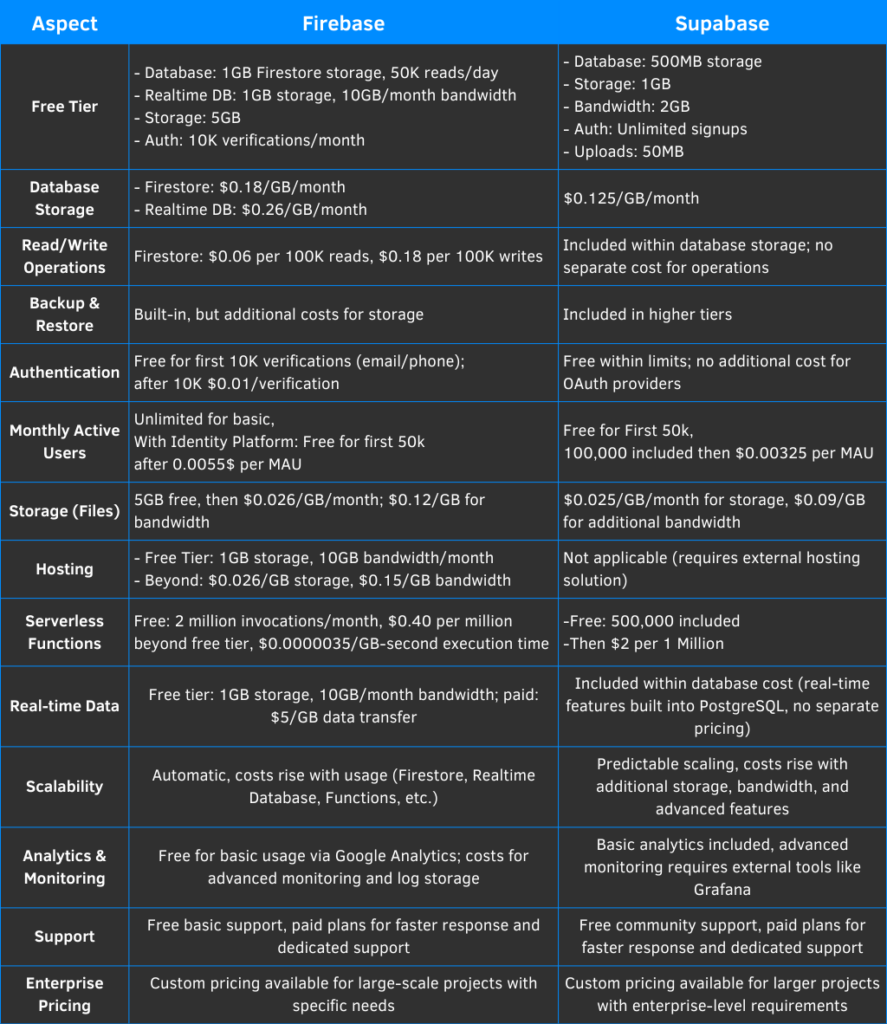
Verdict: Supabase generally offers more cost-effective pricing, especially if you’re mindful of usage.
7. Flexibility and Customization
- Firebase: Firebase is highly opinionated, meaning it provides a lot of built-in functionality, but it can be limiting if you need to customize beyond what’s provided. This makes it a great choice for developers who want to get up and running quickly but may not be ideal for complex custom solutions.
- Supabase: Supabase, with its open-source nature and PostgreSQL foundation, offers more flexibility for customization. You have full control over your database and can extend functionalities as needed.
Verdict: If you need more flexibility and control, Supabase is the way to go.
8. Ecosystem and Community Support
- Firebase: Firebase benefits from Google’s ecosystem, which includes integration with Google Cloud services, powerful tools, and extensive documentation. Its large community ensures that you’ll find solutions and resources quickly.
- Supabase: Supabase is growing rapidly, with an active open-source community and increasing documentation. While not as large as Firebase’s community, it offers a fresh perspective and a strong support system for developers.
Verdict: Firebase has the edge here due to its size and integration with the broader Google ecosystem, but Supabase is rapidly catching up.
Firebase SDK/Client Support:
Firebase offers SDK support for a wide range of platforms, making it versatile for various types of application development:
- Android & iOS: Firebase seamlessly integrates with both Android and iOS apps, supporting development in Java, Kotlin, Swift, and Objective-C.
- Unity & C++: Firebase provides robust SDKs for game development, enabling real-time features and cloud services in Unity and C++ projects.
- Flutter: Firebase supports Flutter, allowing developers to build cross-platform mobile apps with Firebase’s backend services.
- Web: Comprehensive SDK support for JavaScript and TypeScript, integrating with popular web frameworks like React, Angular, and Vue.js.
Admin SDK Support: Firebase offers Admin SDKs in multiple languages, enabling backend and server-side integration:
- Node.js, Java, Python, Go, and C#: These SDKs are essential for managing users, databases, and server-side tasks within Firebase.
Supabase SDK/Client Support:
Supabase offers SDK support focused on modern development environments and languages:
- JavaScript: A primary SDK for web applications, making it easy to integrate with React, Next.js, and other frameworks.
- Flutter: Full support for Flutter, enabling mobile app development with Supabase as the backend.
- Python & C#: SDKs for backend development, allowing easy integration and database management.
- Swift & Kotlin: SDKs for native iOS and Android development, enabling mobile app integration with Supabase’s services.
Supabase’s SDKs focus on simplicity and essential platform support, making it a solid choice for developers working with modern tools and languages.
Which One Should You Choose in 2024?
Now that we’ve covered the strengths and weaknesses of both platforms, the question remains: which one should you choose in 2024?
- Choose Firebase if:
- You need a mature, all-in-one solution.
- Real-time data syncing is a core feature of your application.
- You prefer an easier scaling process.
- You’re heavily invested in the Google ecosystem.
- Choose Supabase if:
- You prefer a relational database and SQL.
- You need more flexibility and control over your backend.
- Cost is a significant factor, and you’re looking for an open-source alternative.
- You’re building a project where customization is key.
Final Thoughts
In 2024, both Firebase and Supabase offer strong, reliable platforms for building your applications. Your choice will ultimately depend on your specific project needs, your familiarity with SQL vs. NoSQL databases, and your preference for flexibility or convenience. Firebase remains a powerful, battle-tested solution, especially for real-time applications. On the other hand, Supabase, with its open-source ethos and PostgreSQL backbone, presents a compelling alternative for developers seeking control and customization.
As the BaaS space continues to evolve, keep an eye on these platforms. Both Firebase and Supabase are likely to introduce new features and improvements, making them even more competitive in the years to come.

